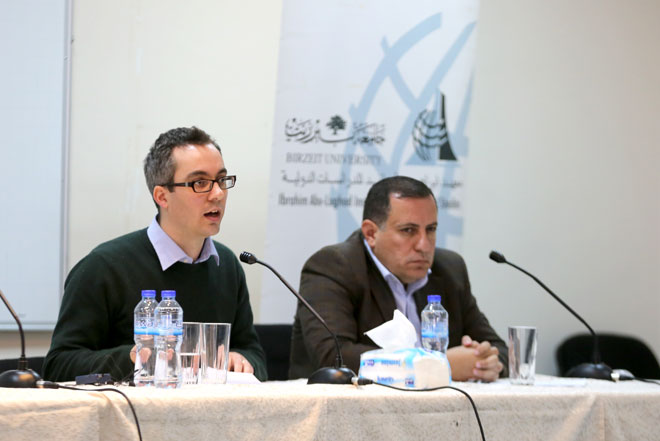Lecture Focuses on Gulf’s Economic Strength and Impact on Non-Oil Countries
Birzeit University’s Ibrahim Abu-Lughod Institute of International Studies held on March 30, 2015, a lecture entitled, “Dependent Neo-Liberalism: Gulf Economic Power in the Mashriq," delivered by Hannes Baumann from King's College, University of London.
The recent oil boom (2001-2014) impacted economic relations within the Arab world. Countries such as Lebanon, Jordan and Egypt have become major destinations for Gulf investment; even Palestine has received some finds. This ‘recycling’ of ‘petro-dollars’ has created new forms of economic and political dependency Baumann argues.
At the beginning of his lecture, Baumann defined neo-liberalism as a package of economic policies that has become widespread in recent decades, and which aims to shift economic power from the government to the private sector on the grounds that this increases government’s efficiency and improves the economic situation of the state.
Baumann went on to say that foreign investment plays a vital role in intervening and influencing state policies, and spoke about foreign investments of the Gulf states in the Arab Mashriq, focusing on the investments of Gulf countries in Egypt, Beirut’s downtown area, Abdali in Jordan and Rawabi in Palestine. Baumann described the experience of UAE businessman Mohammed Alabbar and director general of the Gulf for Investments. He said that foreign investments and multinational corporations have become a kind of economic and political subordination of the host state.
International Studies graduate program director Ahmed Azm introduced the guest speaker, saying that Baumann’s research focuses on the political and economic effects of Gulf investments in non-oil Arab countries. He has studied the political biography of the businessman-politician Rafik Hariri as a manifestation of the political economy of post-war Lebanon.
Hannes Baumann is a Leverhulme Early Career Fellow at King's College London. Hannes Baumann’s research interests are in international political economics, comparative political economics, ethnicity and nationalism. Baumann holds a doctorate and a master's degree from the School of Oriental and African Studies (SOAS) and a Bachelor's degree from the London School of Economics (LSE).







